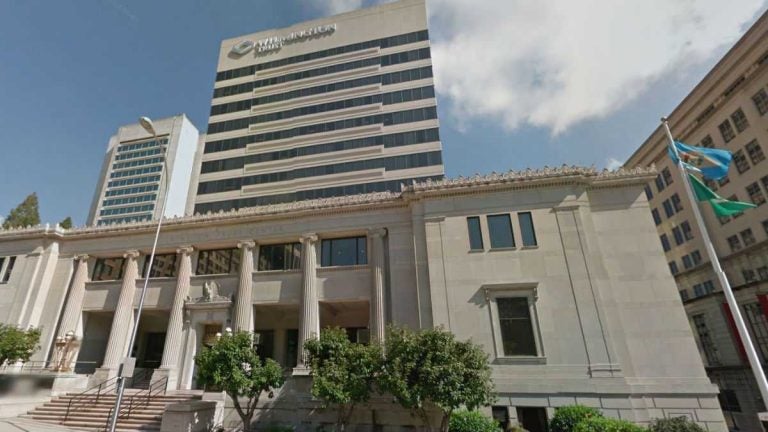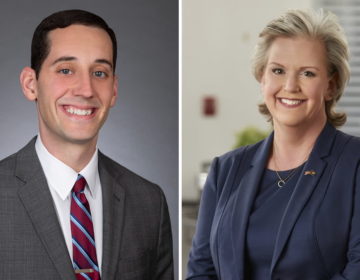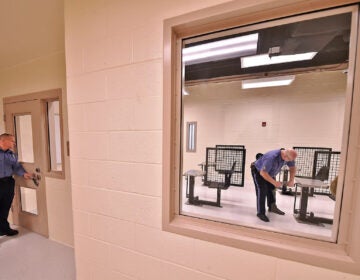The federal case against former Wilmington Trust execs
Jury selection has begun for a trial to determine if four former Wilmington Trust executives are guilty of conspiracy and false statements.

Six former officers of Wilmington Trust have been sentenced to prison for financial crimes. (image via Google Maps)
Jury selection has begun for a trial to determine if four former Wilmington Trust executives are guilty of conspiracy and false statements.
The expected six-week trial is scheduled to begin Oct. 10 in district court in Wilmington before Judge Richard Andrews.
Robert V.A. Harra, 66, and David Gibson, 58, both of Wilmington, William North, 55, of Bryn Mawr, Pa. and Kevyn Rakowski, 61, of Lakewood Ranch, Fla. allegedly concealed from the Federal Reserve, the Securities and Exchange Commission and the public the amount of past due loans on Wilmington Trust’s books between October 2009 and November 2010.
The defendants argue the charges are unfounded because Wilmington Trust’s reporting of matured loans was transparent to the Federal Reserve and others.
The nineteen-count superseding indictment filed in 2015 charges defendants with making false statements in securities filings and to agencies of the U.S. government.
All defendants are charged with conspiracy to defraud the U.S., to commit fraud in connection with the purchase and sale of securities and making false statements to regulators.
They also are charged with one count of false statements in connection with the purchase or sale of securities, four counts of making false entries in banking records, seven counts of making false statements to agencies of the U.S. government and two counts of making false statements in SEC reports.
Harra and Gibson are each charged with two additional counts of making false statements in SEC reports, and Gibson is charged with three counts of falsely certifying financial reports.
North and Rakowski were previously charged with two counts of making false statements to a U.S. agency, relating to the concealment from the market and the Federal Reserve the amount of past due loans on the bank’s books in October and November 2009.
Prosecutors say Wilmington Trust was required to report in its quarterly filings with the SEC and the Federal Reserve the quantity of its loans for which payment was past due for 90 days or more. Investors and banking regulators consider the 90-day number when evaluating the health of a bank’s loan portfolio, according to the U.S. Attorney’s Office.
The four defendants allegedly helped conceal the truth about the status of Wilmington Trust’s loan portfolio from the SEC, the public and the bank’s regulators.
They also allegedly participated in Wilmington Trust’s failure to include in its reporting a material quantity of past due loans despite the reporting requirements, knowing the significance of past due loan volume to investors and regulators.
North, the bank’s chief credit officer, allegedly approved the exclusion or waiver of such loans from internal reports that he knew would be used to generate the bank’s external financial reports.
Harra, the bank’s president and head of regional banking, allegedly encouraged the waiver of past due loans. He served as a primary point of contact with the bank’s regulators during 2009 and 2010, signed bank regulatory filings, participated in quarterly earnings calls with investors and allegedly did not disclose the bank’s failure to report waived loans.
Gibson, the bank’s chief financial officer, also allegedly knew the bank had waived loans from public reporting and failed to disclose this information. He allegedly helped draft and approve SEC filings, and certified those same filings fairly presented the financial condition of Wilmington Trust.
Rakowski, a controller with the bank, allegedly approved the bank’s filings with the SEC and the Federal Reserve knowing those reports didn’t include past due loans that had been waived.
According to court documents, prosecutors say the bank withheld about $53 million in delinquent loans 90 days past due from the report provided to the Federal Reserve, and withheld about $338 million in past due loans from the list provided to the Federal Reserve in advance of the 2010 targeted exam.
In addition, they say it withheld about $48 million in past due loans from the list provided to the Federal Reserve in advance of the 2010 Full-Scope examination.
Court documents include an email between North and Harra that allegedly post-dated the capital raise and predated the 2010 full-scope examination, stating the “Feds … never commented on matureds in the past, but I want to give them no opportunity in the future.”
There’s also a conversation between Rakowski and Gibson allegedly in advance of a required past due loans submission to the Federal Reserve that stated, “We did pull the waived loans from the Past Due report.”
Court documents also detail an email about the bank’s requirement to provide past due loan information to the Federal Reserve on a monthly basis; a response to her request for past due loan information by “two waiver categories,” noting that $338 million in 90 days past due loans had been waived from reporting as of September 2009; and a handwritten note at the top of the printed email stating “Regulators asked for Past Due in Call Report, that is everything”
Prosecutors also claim during an agent interview, North admitted he never shared the Waiver/Mass-Extension practice with the Federal Reserve. In addition, they say during Rakowski’s interview there as an admission the bank did not follow the Call Report instructions in reporting its past due loans.
Prosecutors even posted a January, 2009, email from Brian Bailey, a former Wilmington Trust executive who pled guilty to conspiracy in 2014, to defendant Gibson, detailing a 5-page adaption of the courtroom scene from the film “A Few Good Men,” but with Wilmington Trust staff as the characters.
BAILEY: You want answers?!
KPMG AUDITOR: I want the truth.
BAILEY: You can’t handle the truth!
BAILEY: (continuing) Son, we live in a world where unreasonable clients need 100% financing for real estate deals and those deals need to be approved by lenders with approval authority. Who’s gonna do it? You? You, Mr. Big Shot Auditor? …You have the luxury of knowing what I know: That these loans, while sub-standard, probably created obscene wealth. And my existence, while grotesque and incomprehensible to you, creates that wealth….
KPMG AUDITOR: Did you approve the cash balls?
BAILEY: You’re goddamn right I did!
In court documents, prosecutors say they’ve collected more than 2,000 pages of grand jury transcripts, and introduced more than 300 grand jury exhibits. The case agent and fellow agents conducted more than 200 investigative interviews related to the case, they say.
In August, defense attorneys filed a motion to determine whether prosecutors presented false testimony to the grand jury.
The claimed back in 2013, Federal Reserve Bank examiner David Fomunyam told prosecutors in the Wilmington Trust executives never reported the past-due loans—but that grand jury testimony of an FBI agent contradicts the previous statement, as he testified Fomunyan said “neither of the two were aware” of the practice of failing to report past due loans.
Prosecutors called the defendant’s motion “patently frivolous.” They said the motion “conflates issues, mischaracterizes testimony, omits reference to the full-body of evidence presented before the grand jury, and fails to account for controlling precedent.”
Judge Andrews sided with prosecutors, and denied the defendants motion.
In November 2010, Wilmington Trust was acquired by M&T Bank of New York State at a discount of about 46 percent from the bank’s share price the prior trading day.
WHYY is your source for fact-based, in-depth journalism and information. As a nonprofit organization, we rely on financial support from readers like you. Please give today.




